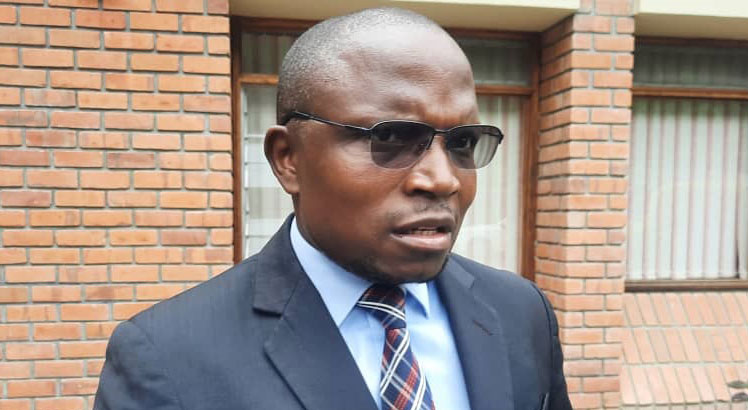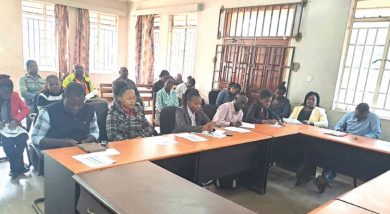MLS, others dare Parliament on DPP powers
Malawi Law Society (MLS) and some individual lawyers have challenged the Legal Affairs Committee of Parliament to provide sensible, timely and transparent checks on the office of the Director of Public Prosecutions (DPP).
Their sentiments come in the wake of a rising number of discontinued cases by the DPP’s office, with several players asking for better ways of ensuring that the office is kept in check.
Some have also suggested the need for the citizenry to try and move the courts for a judicial review when they feel dissatisfied with the DPP’s decisions.
Under the country’s laws, the DPP has powers to discontinue a case, but is required, as provided in Section 99 (3) of the Constitution, to explain the justification to the Legal Affairs Committee of Parliament within 10 days after the order.

But in a written response to a questionnaire, MLS president Patrick Mpaka said holders of public office are expected to act in good faith and the Legal Affairs Committee should take the lead in providing such oversight.
He said: “Key is the role of the Legal Affairs Committee. It represents the public. It must within time interrogate the DPP with transparency and accountability to the people.
“While the Anti-Corruption Bureau [ACB] itself as a public body is accountable to the public, the Constitution has placed an accountability mechanism against the DPP through the Legal Affairs Committee.”
Mpaka said as part of satisfying its constitutional mandate, the Legal Affairs Committee should be at liberty to invite ACB to hear what it has to say about the discontinued case(s) after hearing the reasons from the DPP.
Former Attorney General Charles Mhango agreed with MLS, saying even reporting to Parliament was not working because the Legal Affairs Committee only gets to be told why cases were discontinued and cannot do anything thereafter.
He said: “The Legal Affairs Committee gets reasons post-facto. When you go there, our parliamentarians in that committee are very limited in their role. They are simply told why the DPP has done what he or she has done.
“After that, nothing happens. So if we are really going to have meaningful reform in this country, not just in this area, we really need to rethink and re-arrange our governance structure.”
On his part, legal scholar Mwiza Nkhata said while the exercise of the powers of the DPP, for example, to discontinue criminal proceedings, is not strictly an administrative power, is amenable to judicial review.
He said: “A couple of years back, I was involved in a case [Constitutional Case No. 1 of 2017] in which we challenged the DPP’s takeover and discontinuance of a certain criminal case. The judgement of the High Court in that case was that there is a very narrow range of circumstances under which judicial review of the DPP’s exercise of the powers under section 99 of the Constitution can be permitted.
“What I think is important about this High Court decision is that while it refused to order judicial review of the DPP’s decision, it nevertheless left open a window permitting judicial review in certain limited instances.”
Last month, Legal Affairs Committee of Parliament chairperson Peter Dimba said the DPP was due to appear before the committee when it commences its meetings from May 20 to provide reasons for discontinuance of several high-profile cases.






pin up casino azerbaycan https://azerbaijancuisine.com/# pin up casino az
pin up yukle
buying prescription drugs in mexico mexican northern doctors reputable mexican pharmacies online
mexican pharmaceuticals online northern doctors pharmacy mexican mail order pharmacies
medicine in mexico pharmacies mexican pharmacy п»їbest mexican online pharmacies
buying from online mexican pharmacy: mexican pharmacy online – mexico drug stores pharmacies
mexico pharmacies prescription drugs: northern doctors – mexican border pharmacies shipping to usa
purple pharmacy mexico price list: mexican pharmacy northern doctors – buying from online mexican pharmacy
medication from mexico pharmacy: northern doctors pharmacy – purple pharmacy mexico price list
medicine in mexico pharmacies: mexican pharmacy online – purple pharmacy mexico price list
medicine in mexico pharmacies: Mexico pharmacy that ship to usa – mexican online pharmacies prescription drugs
https://northern-doctors.org/# mexican drugstore online
buying prescription drugs in mexico: Mexico pharmacy that ship to usa – mexican border pharmacies shipping to usa
https://northern-doctors.org/# mexican online pharmacies prescription drugs
п»їbest mexican online pharmacies: northern doctors pharmacy – mexico drug stores pharmacies
https://northern-doctors.org/# mexico pharmacy
mexican drugstore online: mexican northern doctors – mexican drugstore online
mexico drug stores pharmacies: Mexico pharmacy that ship to usa – best online pharmacies in mexico
https://northern-doctors.org/# п»їbest mexican online pharmacies
mexican border pharmacies shipping to usa: northern doctors pharmacy – п»їbest mexican online pharmacies
best online pharmacies in mexico: buying prescription drugs in mexico – mexico pharmacies prescription drugs
reputable mexican pharmacies online mexican pharmacy mexican mail order pharmacies
mexican pharmaceuticals online: cmqpharma.com – mexican border pharmacies shipping to usa